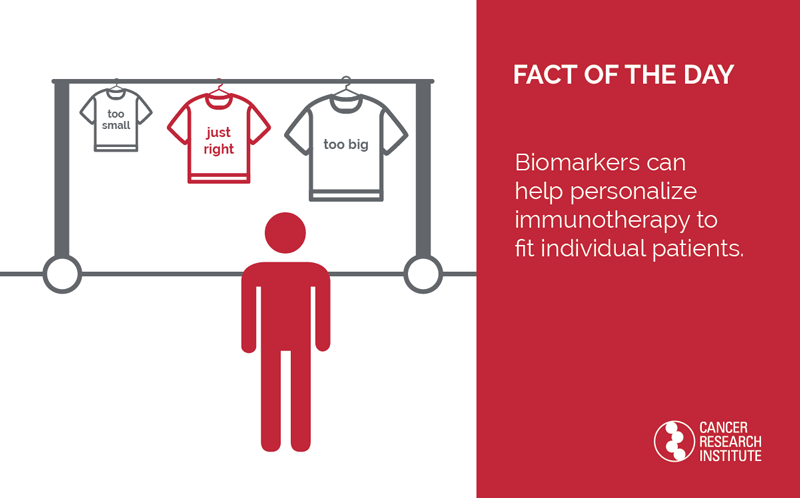
Biomarkers can help personalize immunotherapy to fit individual patients.
Traditionally, patients have been treated in a one-size-fits-all manner, usually based on the location, rather than the specific characteristics, of their tumors. Now, with the rise of immunotherapy, doctors have increasingly focused on using biomarkers—which can be defined as measurable factors that shed light on a patient’s or tumor’s biology—to predict which types of immunotherapy approaches will work best for which patients.
With checkpoint inhibitor immunotherapies for example, patients whose biomarkers indicate that their immune system has already recognized and responded to the tumor are much more likely to benefit from this type of immunotherapy, which gives their immune cells an extra boost that can help them finish the job. Similarly, if a patient’s tumor cells express a certain protein (such as NY-ESO-1) that healthy cells do not normally express, then this lets doctors know that an immunotherapy approach that targets NY-ESO-1 could benefit that patient.
Recently there has been great progress in this area. CRI researchers’ showed that the biomarker Bim could help doctors predict which patients are most likely to benefit from anti-PD-1 checkpoint immunotherapy (as well as monitor them during treatment to gauge its effectiveness). Furthermore, the FDA’s historic approval of pembrolizumab (anti-PD-1 checkpoint immunotherapy) in May was the first time they’d ever approved a cancer treatment for patients based on a biomarker (in this case microsatellite instability, or MSI) rather than the tumor’s origin.
Many different types of potential biomarkers have been discovered, and the following CRI-funded scientists are working to identify the ones that hold the most potential for improving immunotherapy outcomes for patients:
- Nina Bhardwaj, M.D., Ph.D., and Sacha Gnjatic, Ph.D.
- Michael G. Constantinides, Ph.D.
- Zihou Deng, Ph.D.
- Haidong Dong, M.D., Ph.D.
- Julia Kennedy-Darling, Ph.D.
- Amanda Lund, Ph.D.
- Kathleen A. McGuire, Ph.D.
- Sofia L. Novais de Oliveira, Ph.D.
- Stephen P. Schoenberger, Ph.D
Image credit: Cancer Research Institute